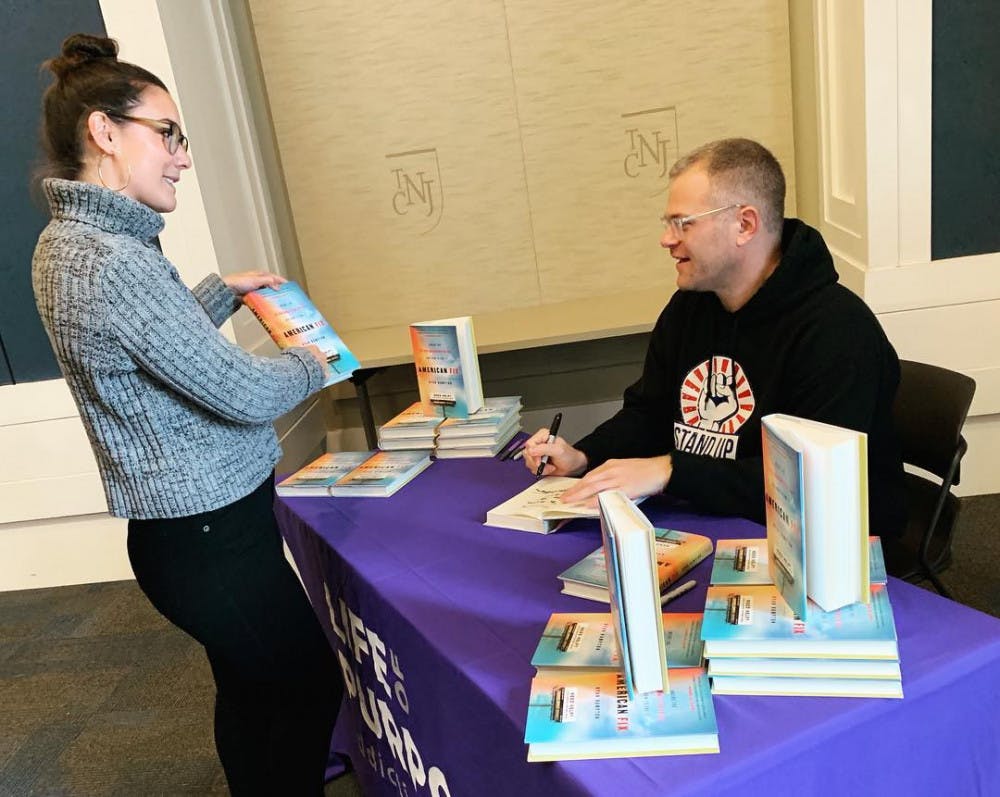By Michael Rodriguez
Correspondent

It all started with a hike in the woods, a knee injury and the surgery that followed. Like many who endure serious procedures, the pain afterward can be excruciating. This too was the case for Ryan Hampton, who found that his prescribed pain medication was his only relief. It was not long before he found himself slowly becoming addicted.
On Friday, Feb. 15, in the Education Building Room 212, the College’s Collegiate Recovery Program partnered with Life of Purpose Addiction Treatment Centers to host Hampton, an author and recovering addict who came to discuss his book, “American Fix: Inside the Opioid Addiction Crisis - and How to End It.”
His book outlines his own recovery process and provides different solutions to the challenges that national recovery movements continue to face.
The national opioid crisis has become a major concern in recent years, with many falling victim to prescription drug addiction, according to Hampton.
Hampton was a part of the Florida pill crisis in the early 2000s, where providers wrote prescriptions for people haphazardly without regulating the supply or checking patients’ backgrounds and susceptibilities.
“The pain killers were weaponized for my medicine cabinet,” Hampton said, “It was very normalized to walk out of the doctor’s office with these military-grade pain killers.”
This is the case for many individuals addicted to opioids and other substances, as prescription drugs are easy to access and even easier to fall victim to, Hampton explained.
For years, Hampton suffered from his addiction and constantly went back to his doctor for more, even long after his recovery period ended –– and they gave it to him.
“I was ashamed and didn’t want anyone else to know,” Hampton said. “My family didn’t want anyone to know.”
Hampton was accompanied by community recovery advocates, who served as visiting panel members at the event –– Andrew Burki, John Hulick and Sarah Espenshade work to spread awareness of drug addiction and the importance of recovery.
Hulick, former adviser to former Gov. Chris Christie and former “Drug Tsar” of Florida, was responsible for bringing awareness of the prescription situation to New Jersey officials’ attention. While working in Florida, Hulick tracked the patterns of written prescriptions and questioned pharmaceutical providers on their abundant sales. He recalled how providers would look at the data and deny that there was a problem.
“I told them ‘you filed that data to the federal government,’” he said. “‘So yes, there is a problem.’”
Espenshade, a counselor who specializes in drug addiction, runs an outpatient program in Delaware County, Pennsylvania that focuses on patient recovery after treatment. Without this service, other tragedies such as homelessness, relapses and higher suicide rates are more likely, she explained.
“This is not just an opioid crisis,” Espenshade said. “This is a national behavior crisis.”
One of the crucial points the panel touched on was the difference between treatment and recovery. Hulick believes treatment quantifies medication, therapy and outside support. Recovery is the period of rebuilding careers, relationships and one’s personal identity. He shared that it is wrong to use the words “treatment” and “recovery” interchangeably, and that long-term recovery plans should accompany treatment plans.
“The quality of care should shift from primarily treatment to recovery,” Hulick said. “Long-term recovery is more impactful and allows for better results.”
In the case of Burki, the founder of the Life of Purpose addiction recovery center, an organized recovery plan is of the utmost importance. Reducing the stigma of addiction through long-term recovery plans shows people who are not addicts the positive impact that these plans can have when it comes to overcoming addictions.
“The best way to reduce stigma is to be successful,” Burki said. “(It is) showing that they are not just successful recovering addicts — they are successful citizens.”
As a strong advocate for youth programs combating drug addiction, Burki hopes that younger generations will band together to end the stigma and create programs that help those around them achieve success and have access to proper treatment.
TCNJ CRC is one such organization that seeks to accomplish this goal. As a relatively new organization, TCNJ CRC organized this event to encourage discussion of drug addiction and recovery on campus.
TCNJ CRC President Hannah Lemke, a senior psychology and biology double major, hopes that panels like these will increase awareness and help advocate for those who might benefit from these services.
“We work with them all the time, hosting discussions and panels with their support,” Lemke said.
Hampton ended the panel by further discussing his book and exploring what treatment and recovery was like for him and others suffering from addiction. He hopes that by sharing his experience and advocating for more awareness, he can help prevent addiction in the future.
“I didn’t plan on writing a book,” he said. “But telling our stories and recovering out loud is the best way to go.”







